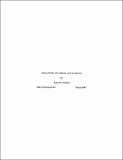Irreversibility, uncertainty and investment
Author(s)
Pindyck, Robert S.
Download28596048.pdf (3.554Mb)
Metadata
Show full item recordAbstract
Most investment expenditures have two
important characteristics. First, they are largely irreversible; the firm cannot disinvest,
so the expenditures are sunk costs. Second, they can be delayed, allowing the firm to wait
for new information about prices, costs, and other marketing conditions before committing
resources. An emerging literature has shown that this has important implications for
investment decisions, and for the determinants of investment spending. Irreversible
investment is especially sensitive to risk, whether with respect to future cash flows,
interest rates, or the ultimate cost of the investment. Thus if a policy goal is to
stimulate investment, stability and credibility may be more important than tax incentives or
interest rates. This paper presents some simple models of irreversible investment, and shows
how optimal investment rules and the valuation of projects and firms can be obtained from
contingent claims analysis, or alternatively from dynamic programming. It demonstrates some
strengths and limitations of the methodology, and shows how the resulting investment rules
depend on various parameters that come from the market environment. It also reviews a number
of results and insights that have appeared in the literature recently, and discusses
possible policy implications.
Date issued
1990Publisher
MIT Center for Energy and Environmental Policy
Research
Other identifiers
90-007
Series/Report no.
Working paper (Massachusetts Institute of
Technology. Center for Energy Policy Research) ; MIT-CEPR 90-007.